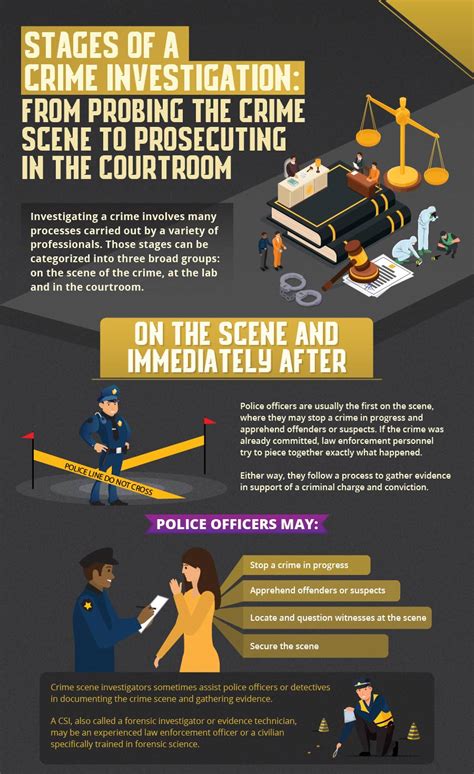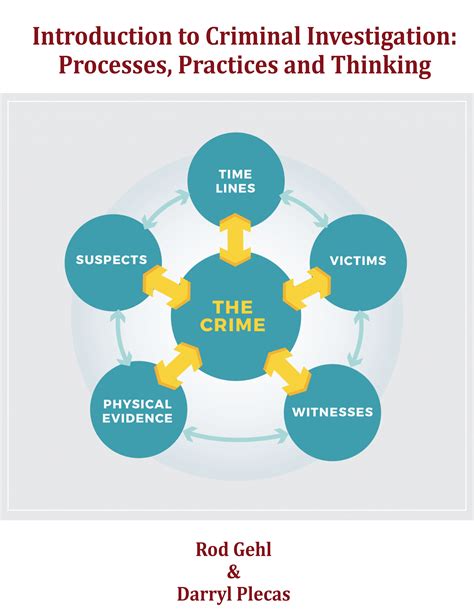Have you ever been captivated by the enigmatic world of crime-solving? The allure of deciphering cunning puzzles, untangling complex webs of deceit, and ultimately unraveling the truth is a dream for many who seek a career that goes beyond the ordinary. If you possess an insatiable curiosity, a keen eye for detail, and an unwavering commitment to justice, then embarking on the path to becoming a detective may just be your calling.
In this article, we will delve into the exciting realm of investigative work, offering a comprehensive guide on how to navigate the intricacies of pursuing a successful future in this thrilling profession. By exploring the various skills, education, and experiences necessary to thrive as a detective, we will equip you with valuable insights and practical advice to embark on this extraordinary journey.
Developing a relentless pursuit of truth
At the heart of every successful detective lies an unwavering determination to leave no stone unturned in the pursuit of truth. With each case presenting its unique challenges, it is crucial to cultivate a steadfast mindset that refuses to yield to obstacles. As an aspiring detective, you must embrace the exhilarating yet sometimes overwhelming nature of this profession, holding steadfast in your commitment to ensuring justice is served.
Embracing the art of observation
In the world of crime-solving, attention to detail is paramount. A keen eye that can observe even the smallest of clues may hold the key to cracking a case wide open. Developing a heightened sense of observation is an essential skill that detectives must hone. By training your mind to notice patterns, anomalies, and inconspicuous details, you will sharpen your ability to connect the dots and unlock solutions that others may have overlooked.
Cultivating a diverse set of skills
A detective's journey is a multi-faceted one, encompassing a wide range of skills and competencies. From exemplary communication abilities that facilitate effective interrogations to honing analytical thinking to solve complex puzzles, the path to becoming a successful detective requires a diverse skill set. Additionally, proficiencies in forensic science, psychology, and law enforcement practices are invaluable assets that equip you to handle the myriad challenges that arise in the realm of crime-solving.
Uncovering the path to a fulfilling career
While the journey to becoming a detective may be arduous and demanding, the rewards are immeasurable. A career in crime-solving offers not just the satisfaction of bringing justice to victims but also the opportunity to make a meaningful impact on society. By honing your abilities, embracing a lifelong commitment to learning, and embarking on this remarkable journey, you have the potential to join the ranks of those who tirelessly strive to uncover the truth, one mystery at a time.
Starting Your Journey in the Field of Criminal Investigation

Embarking on a path towards becoming a crime solver is an exciting endeavor that requires dedication, knowledge, and an unwavering determination to seek justice. This section will explore the first steps you can take towards pursuing a career in the fascinating world of criminal investigation.
- Develop a solid foundation in relevant academic fields: Building a strong educational background is crucial in order to gain a comprehensive understanding of the intricacies of crime solving. Courses in criminology, psychology, forensic science, and law provide an excellent starting point.
- Seek out practical experience opportunities: While knowledge gained through academic pursuits is important, practical experience is equally essential. Consider volunteering or interning with local law enforcement agencies to gain firsthand exposure to investigative practices and procedures.
- Enhance your analytical and problem-solving skills: Detectives are often required to analyze complex crime scenes and develop hypotheses based on the available evidence. Sharpening your analytical and problem-solving abilities can greatly enhance your effectiveness in this field.
- Stay updated with the latest advancements: The field of criminal investigation is constantly evolving, with new techniques and technologies being introduced regularly. Subscribing to journals, attending conferences, and participating in relevant workshops can help you stay abreast of the latest developments in the field.
- Build a network of professionals: Connecting with professionals already working in the field can provide valuable insights and guidance. Attend industry events, join professional organizations, and participate in online forums to build a network that can support you in your journey.
Starting a career in crime solving requires a combination of theoretical knowledge and practical experience. By taking these initial steps, you can set yourself on the path towards achieving your dream of becoming a skilled detective and making a difference in the world of criminal investigation.
Unleash Your Inner Sherlock Holmes
Unlocking the detective within you means tapping into the essence of the legendary Sherlock Holmes. Explore your innate powers of observation, deduction, and intuition to channel your inner detective and solve mysteries with finesse. In this section, we will delve into techniques and practices that will help you cultivate and nurture your detective skills.
| 1. Master the Art of Observation |
| Enhance your ability to perceive the smallest details by training your senses. Practice mindfulness and engage in exercises like memory games and puzzles to sharpen your observation skills. |
| 2. Sharpen Your Deductive Reasoning |
| Develop the ability to draw logical conclusions from incomplete information. Cultivate your deductive reasoning by analyzing patterns, making connections, and utilizing your acquired knowledge to solve complex problems. |
| 3. Hone Your Intuition |
| Trust your gut instincts and embrace your intuition as a valuable tool in crime solving. Learn to listen to your inner voice and make decisions based on subtle cues and gut feelings. |
| 4. Brush Up on Forensic Science |
| Familiarize yourself with the basics of forensic science to understand how evidence is collected, analyzed, and used in criminal investigations. Stay updated with advancements in technology and techniques used in modern crime-solving. |
| 5. Practice Effective Communication |
| Communication is key in the world of crime solving. Develop strong interpersonal skills, learn to ask the right questions, and improve your ability to actively listen and understand others. Effective communication will help you gather information and collaborate with others in your pursuit of truth. |
| 6. Embrace Critical Thinking |
| Train your mind to think critically and analyze situations from multiple perspectives. Question assumptions, evaluate evidence thoroughly, and maintain an objective approach to reach sound conclusions. |
| 7. Cultivate Perseverance and Resilience |
| Investigate challenging cases with determination and persistence. Developing resilience will help you bounce back from setbacks, adapt to new circumstances, and continue your pursuit of justice even in the face of adversity. |
| 8. Learn from the Masters |
| Study the works of famous detectives like Sherlock Holmes, Hercule Poirot, and Miss Marple to gain insights into their methods and thought processes. Take inspiration from their brilliance and adapt their techniques to suit your own style of crime solving. |
By immersing yourself in the mindset and techniques of legendary detectives, you can unlock your own potential as a master crime solver. Embrace the challenge, train your mind, and unleash your inner Sherlock Holmes to embark on an exciting and rewarding journey in the world of crime solving.
Essential Steps to Launch Your Journey in Unraveling Mysteries

Embarking on a path towards solving enigmatic puzzles and uncovering hidden truths requires a strategic approach. This section delves into the crucial steps one must undertake to kickstart their adventure in the realm of crime-solving. Here, we will explore the fundamental aspects of initializing your career as a detective, equipping you with the knowledge and skills necessary to navigate through perplexing investigations.
1. Cultivate Your Analytical Mindset
Fostering a keen sense of observation and attention to detail is paramount in the realm of crime-solving. Develop your analytical mindset by engaging in activities that enhance your critical thinking abilities. This might involve solving puzzles and brain teasers, studying logic and reasoning, or exploring psychology to understand the complexities of human behavior.
2. Acquire the Necessary Education and Training
A solid educational foundation is vital for aspiring detectives. Research reputable institutions that offer programs in criminal justice, criminology, or forensic science. Pursuing a degree in these fields will equip you with a comprehensive understanding of the criminal justice system, investigative techniques, and forensic analysis. Additionally, seek opportunities for practical training through internships or volunteer work to gain hands-on experience in the field.
3. Develop Effective Communication Skills
Communication lies at the heart of being a successful detective. Enhance your verbal and written communication skills to effectively interact with witnesses, colleagues, and superiors. Seek opportunities to develop your interviewing techniques, negotiation skills, and report writing abilities. Adept communication will aid in building trust, gathering credible information, and presenting convincing arguments.
4. Embrace Technological Advancements
In our digital era, technology plays a crucial role in solving crimes. Familiarize yourself with the latest investigative tools, software, and forensic techniques utilized in the field. Stay updated with advancements in areas such as digital forensics, data analysis, and surveillance technology. This technical proficiency will greatly enhance your investigative abilities and improve your overall efficiency.
5. Gain Practical Experience
While academic knowledge is valuable, hands-on experience is equally important in the world of crime-solving. Seek opportunities to work alongside experienced detectives or law enforcement agencies to gain practical insights into the intricacies of investigations. Shadowing professionals in the field will provide valuable guidance, mentoring, and exposure to real-life cases, accelerating your learning process and honing your skills.
6. Maintain Physical and Emotional Well-being
Being a detective can be demanding both physically and emotionally. Maintain a healthy and fit lifestyle to ensure you are prepared to face the challenges of the profession. Engage in regular exercise, practice stress management techniques, and cultivate resilience to cope with the often intense and stressful nature of investigations.
By embracing these essential steps and embodying the attributes of a detective, you will be well-equipped to embark on a fulfilling and rewarding career in the captivating world of crime-solving.
Gaining Knowledge: The Key to Success in the Field of Criminal Investigation
Building a solid foundation of knowledge is essential for anyone aspiring to excel in the realm of unraveling mysteries and solving crimes. In this section, we will explore the significance of acquiring diverse information and skills to pave your way towards becoming a proficient investigator.
1. Broadening Your Mind: To succeed in the world of crime solving, it is crucial to have a multidisciplinary approach. Embrace a wide range of subjects such as psychology, sociology, forensic science, and law enforcement techniques. Taking the time to understand different perspectives and methods will enable you to think outside the box and approach investigations from various angles.
2. Honing Analytical Abilities: Developing strong analytical skills is a fundamental component of becoming an effective crime solver. This involves the ability to scrutinize evidence, detect patterns, and make logical connections. Sharpening your critical thinking abilities will help you evaluate situations objectively and draw accurate conclusions.
3. Embracing Technological Advancements: In today's digital era, staying up to date with the latest technological advancements is crucial in the field of criminal investigation. Familiarize yourself with cutting-edge tools and techniques used for data analysis, surveillance, and forensic examinations. Embracing technology can significantly enhance your investigative capabilities and augment the success rate of your cases.
4. Cultivating Effective Communication: Communication skills are paramount, especially when collaborating with various stakeholders such as victims, witnesses, and other law enforcement agencies. Learning to establish rapport, ask the right questions, and actively listen can provide invaluable insights and aid in obtaining critical information. Effective communication also extends to presenting your findings concisely and accurately.
5. Continuous Learning and Adaptability: The field of crime solving is constantly evolving, and as an investigator, it is crucial to remain open to learning and adapting. Stay updated on emerging techniques, follow industry trends, and engage in professional development opportunities such as workshops, conferences, and training sessions. By continuously expanding your skill set, you will be better equipped to handle the ever-changing landscape of criminal investigations.
In conclusion, gaining knowledge is a vital key to unlocking success in the field of criminal investigation. By embracing a multidisciplinary approach, honing analytical abilities, keeping up with technological advancements, cultivating effective communication, and embracing continuous learning, you can set yourself apart as a competent and capable crime solver.
FAQ
What qualifications and skills do I need to become a detective?
To become a detective, you typically need to have a strong educational background, with at least a high school diploma or equivalent. Some agencies may require a college degree in criminal justice or a related field. In terms of skills, detectives must have excellent communication and observation skills, critical thinking ability, attention to detail, and the ability to work under pressure. Additionally, having knowledge of forensic science and technology can be beneficial.
Are there any specializations within the field of detecting that I can pursue?
Yes, there are various specializations within the field of detecting. Some detectives specialize in areas such as homicide investigations, fraud, cybercrime, narcotics, or organized crime. Specializing in a specific area allows you to develop expertise and work on cases that align with your interests and strengths.
Is being a detective a dangerous job?
Being a detective can be inherently risky and dangerous due to the nature of the work. Detectives often deal with criminals, investigate crime scenes, and may encounter situations that require physical confrontation or putting their lives at risk. However, law enforcement agencies take various measures to ensure the safety of their detectives, such as providing training, protective gear, and support from backup officers.
What are the potential career advancements for a detective?
As a detective, there are several potential career advancements you can pursue. You may progress to higher ranks within the detective division, such as becoming a senior detective or a detective sergeant. Some detectives choose to transition into supervisory roles, such as becoming a lieutenant or captain. Additionally, there are opportunities to work in specialized units or task forces, where you may tackle complex cases or collaborate with other law enforcement agencies.






